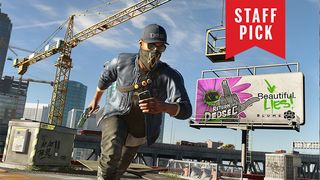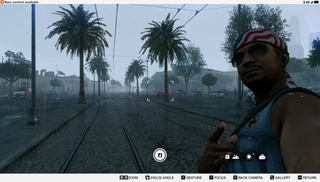Watch Dogs 2 has major problems, but its sense of fun shines through
Sandbox freedom overcomes the many dumb parts of Ubisoft's open-world escapade.


Along with our group-selected 2016 Game of the Year Awards, each member of the PC Gamer staff has independently chosen one game to commend as a personal favorite of the year. We'll continue to post new Staff Picks throughout the rest of 2016.
James wasn't too impressed by Watch Dogs 2 when he reviewed it, and for good reason. The shooting isn't great, the stealth is basic and finickity, and the open world does suffer from that specific Ubisoft-brand busywork, with lots of collectibles all collected by doing the same basic thing over and over again. And while I'd never resort to using overly flowery terms like 'ludo-narrative dissonance', it's hard not to see some major dissonance within Watch Dogs 2's narrative—y'know, ludologically speaking. This is a game about hackers trying to solve the worlds problems by a) causing the same problems to different people, b) doing straight up crimes, c) possibly lots of murders with your 3D printed weapons. It's really dumb.
But this is the nature of subjectivity and preference. One man's 68% is another man's 'hold on, I'm having a great time here.' By which I mean Watch Dogs 2 has lots of problems, but I'm loving it despite them.
The key here is that I love playing around with systems in a sandbox environment, and, as long as I have that, I can forgive a lack of immersion or consistent characterisation. The best games—for instance, Dishonored 2—offer both. Even great games—Hitman—feature enough of the latter. Watch Dogs 2, arguably, does not. It is weird that this can be a game about shooting up the entirety of San Francisco—more so even than GTA 4, a game specifically about how much the main character wanted to make a new, less murderous life for himself. But Watch Dogs 2 is still filled with interesting systems, and each mission is a miniature sandbox in which to apply them.

These characters aren't using each other, or being needlessly dickish or competitive.
The RC car is a fantastic device. With it, you're able to scout out an area, remotely hack terminals, and, in the best cases, complete your mission objective without entering a vehicle. This is what makes Watch Dogs 2 work for me: even though stealth is shallow, it's the route to an extra level of systems and challenge that reward creative solutions.
In one ostensibly difficult infiltration mission, I sent in my RC car via window lift. Alas, downloading the data required me to be physically near the the target computer. Rather than repeat the RC car's route in person, I again used the lift to reach a place on the roof—technically putting myself in proximity of my target, but also far above it. An entire building of guards were searching for me as I chilled on the roof. That's a great expression of Watch Dogs 2's stated atmosphere.
Away from the systemic freedom on offer, I also appreciate Watch Dogs 2's fiction—something I never thought I'd say based on the tiresomely dour original. This is a game about people who fundamentally like each other. These characters aren't using each other, or being needlessly dickish or competitive. All of the conflict comes from outside the core group, who grow closer as a result of their shared goals. Essentially, they're mates. That's a surprisingly rare thing for a game to depict, and precisely why it feels so weird that you can print out an expensive sniper rifle and go full psychopath.

It's a cathartic game, too. There's something inherently satisfying about being able to dick over a person who is definitely not Martin Shkreli, or an organisation that is definitely not Scientology, or a company that is definitely not Facebook. It's silly of course—the most exaggerated, Hackers-esque version of hacking. But that's fine. It adds to the absurd sense of fun.
PC Gamer Newsletter
Sign up to get the best content of the week, and great gaming deals, as picked by the editors.
So yes, Watch Dogs 2 is a game with major problems. But its systemic depth, tone and setting made for my favourite open world game of the year. It's not something I'll ever 100% complete, or even remember much in a couple of years time, but, right now, it's an entertaining place to enjoy.
No other game has let me muck about with a scissor lift for an afternoon, and that has to count for something.

Phil has been writing for PC Gamer for nearly a decade, starting out as a freelance writer covering everything from free games to MMOs. He eventually joined full-time as a news writer, before moving to the magazine to review immersive sims, RPGs and Hitman games. Now he leads PC Gamer's UK team, but still sometimes finds the time to write about his ongoing obsessions with Destiny 2, GTA Online and Apex Legends. When he's not levelling up battle passes, he's checking out the latest tactics game or dipping back into Guild Wars 2. He's largely responsible for the whole Tub Geralt thing, but still isn't sorry.
Most Popular





